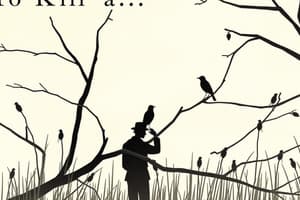Podcast
Questions and Answers
What is the primary purpose of persuasive writing?
What is the primary purpose of persuasive writing?
- To persuade and influence the audience (correct)
- To provide hard evidence
- To convey a story
- To conduct research
What is a key difference between persuasive and argumentative writing?
What is a key difference between persuasive and argumentative writing?
- Persuasive writing is more formal, while argumentative writing is more casual
- Persuasive writing is used in academic settings, while argumentative writing is used in creative writing
- Argumentative writing relies on emotional appeal, while persuasive writing relies on logical reasoning
- Argumentative writing requires hard evidence, while persuasive writing relies on emotional appeal (correct)
What is the definition of credibility?
What is the definition of credibility?
- The quality of being dishonest or deceitful
- The quality of being Stingy and unwilling to spend
- The quality of being trusted or believed in (correct)
- The quality of being unwilling to spend or ungenerous
What does the author use to persuade the audience in persuasive writing?
What does the author use to persuade the audience in persuasive writing?
What is the definition of auspicious?
What is the definition of auspicious?
What is the definition of truancy?
What is the definition of truancy?
What is the definition of vivid?
What is the definition of vivid?
What is the definition of peculiar?
What is the definition of peculiar?
What is the primary purpose of a primary source?
What is the primary purpose of a primary source?
What is the term for a statement that can be proven true or false?
What is the term for a statement that can be proven true or false?
What is the purpose of an in-text citation in MLA format?
What is the purpose of an in-text citation in MLA format?
What type of text is a diary considered?
What type of text is a diary considered?
What is the term for a significant or huge deal?
What is the term for a significant or huge deal?
What is the purpose of a reference or informational text?
What is the purpose of a reference or informational text?
Where does the punctuation go in an MLA in-text citation?
Where does the punctuation go in an MLA in-text citation?
What is the purpose of a direct quote in a research paper?
What is the purpose of a direct quote in a research paper?
What is the primary theme of the image analysis task?
What is the primary theme of the image analysis task?
What is the primary structure required for the paragraph in the final exam?
What is the primary structure required for the paragraph in the final exam?
What is the main idea of the speech analysis task?
What is the main idea of the speech analysis task?
What is the purpose of the in-text citation in the final exam?
What is the purpose of the in-text citation in the final exam?
What is the minimum sentence requirement for the final exam?
What is the minimum sentence requirement for the final exam?
What is the significance of the year 1955 in the context of the speech analysis task?
What is the significance of the year 1955 in the context of the speech analysis task?
What is the primary focus of the image analysis task in terms of the picture?
What is the primary focus of the image analysis task in terms of the picture?
What is the point value for properly using the PEEL paragraph structure in the final exam?
What is the point value for properly using the PEEL paragraph structure in the final exam?
Flashcards are hidden until you start studying
Study Notes
Part Six: Analyzing Speech
- The speech is about the Montgomery Bus Boycott (1955) by Martin Luther King Jr.
- The boycott was a response to the unfair treatment of African Americans on Montgomery buses.
- The speech highlights the themes of racism, discrimination, and perseverance.
P.E.E.L. Format
- P.E.E.L. format is used for writing persuasive and argumentative essays.
- Persuasive writing uses logic and reasons to prove a point, and influences the audience through emotions and opinions.
- Argumentative writing is more formal and academic, and requires hard evidence and research to support a claim.
Vocabulary
- Credibility: the quality of being trusted or believed in.
- Stingy: unwilling to spend or ungenerous.
- Auspicious: giving signs or conductive of future success.
- Cunning: having skill in being dishonest or achieving one's ends by deceit or evasion.
- Truancy: the act of being absent from school without permission.
- Verdict: a decision made by a jury or judge in a court case.
- Exile: forced to stay away from a place.
- Unalienable: not capable of being taken away or denied.
- Insufficient: not enough; inadequate.
- Sweltering: uncomfortably hot.
- Invigorating: the feeling of possessing energy; energized.
- Tranquility: in a state of calmness; peace.
- Drowsy: feeling sleepy.
- Timid: displaying a lack of courage or confidence.
- Obituary: a notice of a death.
- Scowl: to frown or glare in an angry manner.
- Petrified: extremely scared.
- Peculiar: strange, odd and unusual.
- Vivid: producing clear and powerful mental images.
- Tedious: tiresome or boring.
- Attorney: a person who acts on behalf of another in legal matters.
- Demonstration: showing something that is real or evident.
- Momentous: a significant or huge deal.
- Withering: shrinking or deteriorating. Slowly dying.
- Prosperity: success.
Part Three: True and False General Knowledge
- Punctuation goes outside the parenthesis in MLA in-text citations.
- A direct quote must be followed by an in-text citation.
- A fact is a statement that can be verified or proven through evidence.
Types of Non-fictions
- Personal or Primary Sources:
- Diaries
- Journals
- Essays
- Interviews
- Podcasts
- Editorials
- Autobiographies
- Letters/emails
- References or Informational Text:
- Textbooks
- User Manuals
- Encyclopedias
- Dictionaries
- Research Papers
- Newspapers
- Biographies
- Documentaries
Studying That Suits You
Use AI to generate personalized quizzes and flashcards to suit your learning preferences.




